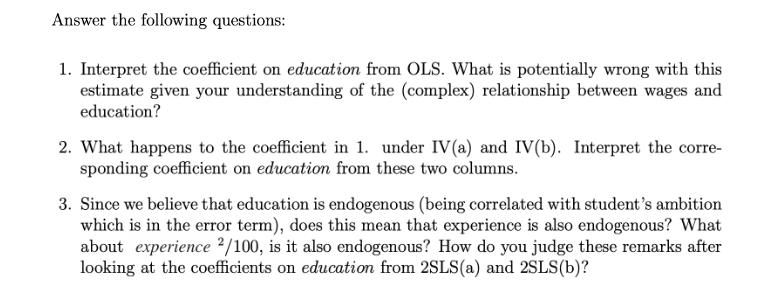Answered step by step
Verified Expert Solution
Question
1 Approved Answer
David Card, a famous labor economist at Berkeley, was interested in studying the effect of education on wages. We may recall that we cannot


David Card, a famous labor economist at Berkeley, was interested in studying the effect of education on wages. We may recall that we cannot measure students' ability, so we the OLS coefficient on education would not have causal interpretation due to OVB. In one of his influential papers, Card (1995), he suggested that if a potential student lives close to a college this would reduce the cost of attendance and thereby would raise the likelihood that the student will attend college. Moreover, he argues that college proximity does not directly affect a student's skills or abilities so should not have a direct effect on his/her market wage. These considerations suggest that college proximity can be used as an instrument for education in a wage regression. The dependent variable y is the log of weekly earnings of a student. The explanatory variables that Card used are: education (years of schooling), experience (years of work experience, calculated as age (in years) less education + 6), experience/100, Black (an indicator for whether a student is black), south (an indicator for residence in the southern region of the US), and urban (an indicator for residence in a standard metropolitan statistical area). Various regression outputs are presented in Table 4 with the following description: - IV (a) uses college (whether a student grew up in same county as a 4-year college) as an instrument for education. IV(b) uses college, age, and age/100 as instruments for education, experience, and experience/100. - 2SLS (a) uses public (whether a student grew up in same county as a public 4-year college) and private (whether a student grew up in same county as a private 4-year college) as instruments for education. - 2SLS (b) uses public, private, age, and age as instruments for education, experience, and experience/100. Answer the following questions: 1. Interpret the coefficient on education from OLS. What is potentially wrong with this estimate given your understanding of the (complex) relationship between wages and education? 2. What happens to the coefficient in 1. under IV (a) and IV(b). Interpret the corre- sponding coefficient on education from these two columns. 3. Since we believe that education is endogenous (being correlated with student's ambition which is in the error term), does this mean that experience is also endogenous? What about experience 2/100, is it also endogenous? How do you judge these remarks after looking at the coefficients on education from 2SLS(a) and 2SLS(b)?
Step by Step Solution
★★★★★
3.37 Rating (150 Votes )
There are 3 Steps involved in it
Step: 1
The detailed ...
Get Instant Access to Expert-Tailored Solutions
See step-by-step solutions with expert insights and AI powered tools for academic success
Step: 2

Step: 3

Ace Your Homework with AI
Get the answers you need in no time with our AI-driven, step-by-step assistance
Get Started


